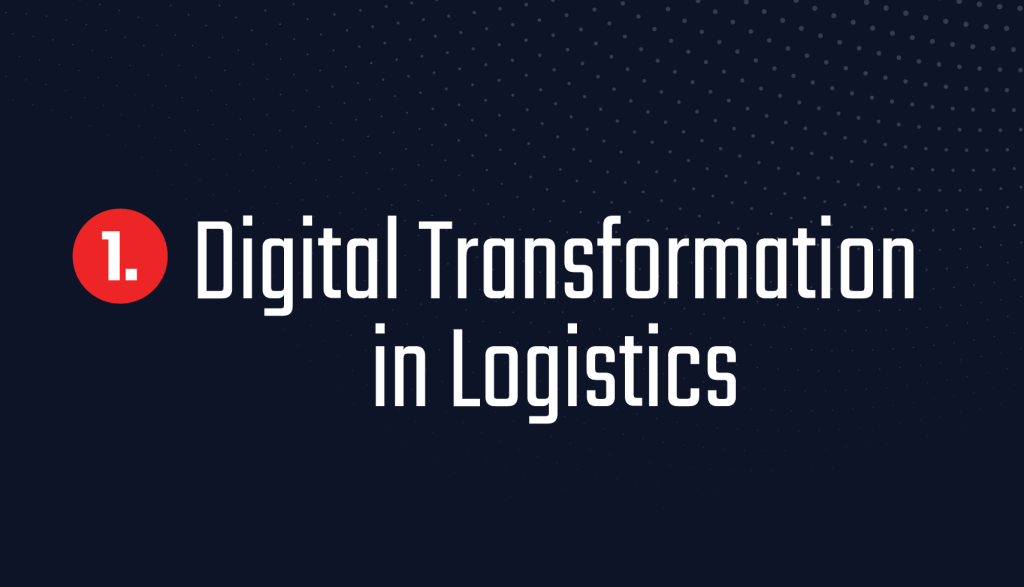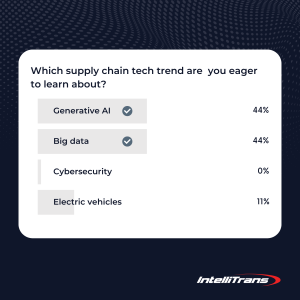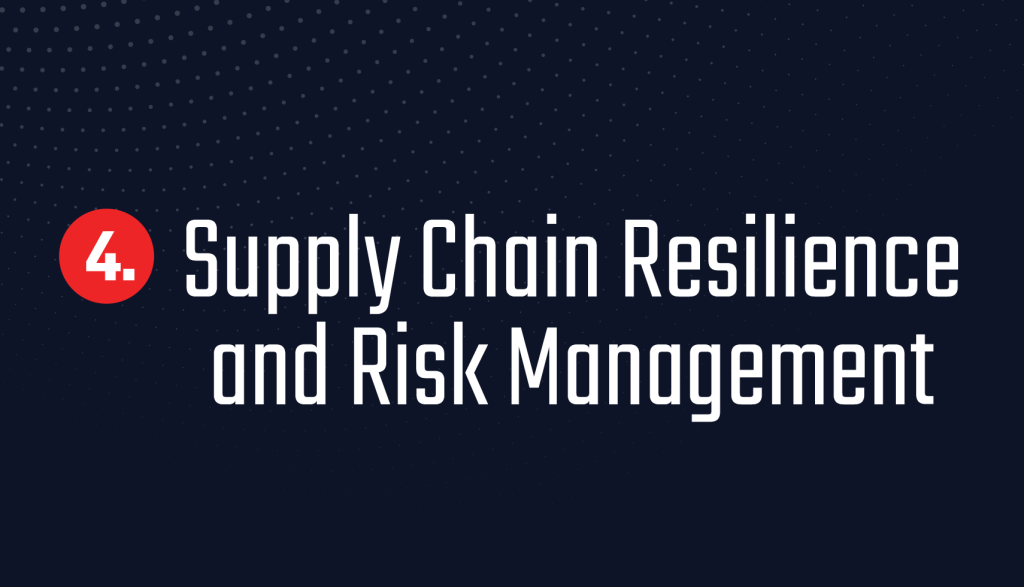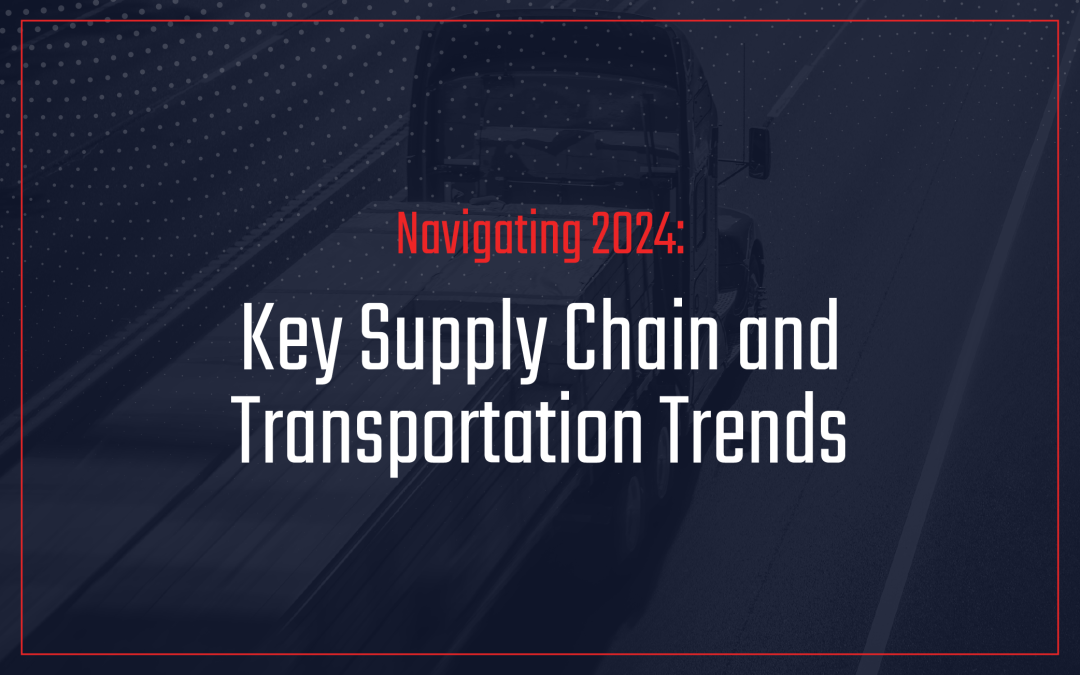The logistics and supply chain industry is evolving at a breakneck pace. Keeping up with the latest trends is crucial for staying competitive and efficient. As we navigate through 2024, several key trends will shape the remainder of the year.
We predict these will be the biggest trends in supply chain management, transportation management, and logistics for the remainder of the year, and we’re sharing our ideas to help you adapt effectively.

1. Digital Transformation in Logistics
Digital transformation continues to be a driving force in the logistics sector. Companies are increasingly adopting digital tools and technologies to streamline operations, enhance visibility, and improve decision-making.
Impact on Supply Chain Management
- Improved efficiency: Digital solutions like warehouse management systems (WMS) and transportation management systems (TMS) help optimize inventory control and route planning, reducing costs and improving delivery times.
- Enhanced visibility: Real-time tracking and data analytics provide greater visibility into supply chain operations, allowing for quicker responses to disruptions.
Actionable Steps to Adapt
- Invest in digital tools: Evaluate and implement digital platforms that offer robust features for managing logistics operations.
- Train your workforce: Ensure your team is well-versed in using new technologies through continuous training and development programs.
Leverage data analytics: Utilize data analytics to gain insights into your supply chain performance and identify areas for improvement.

2. Sustainability and Green Logistics
Sustainability is no longer just a buzzword; it’s a critical component of modern logistics strategies. Companies are under increasing pressure to reduce their environmental footprint and adopt green logistics practices.
Impact on Transportation Management
- Reduced emissions: Adopting electric vehicles (EVs) and alternative fuels helps lower greenhouse gas emissions.
- Eco-friendly packaging: Using recyclable and biodegradable materials reduces waste and supports sustainability goals.
Actionable Steps to Adapt
- Implement green technologies: Invest in EVs, renewable energy sources, and energy-efficient warehouse practices.
- Optimize routes: Use route optimization software to minimize fuel consumption and emissions.
Engage in carbon offsetting: Participate in programs that offset your carbon emissions by supporting environmental projects.

3. Increased Use of AI and Automation
Artificial intelligence (AI) and automation are revolutionizing logistics operations. These technologies, from predictive analytics to automated warehouses, enhance efficiency and reduce operational costs.
Impact on Logistics Operations
- Predictive maintenance: AI can predict equipment failures before they happen, reducing downtime and maintenance costs.
- Automated warehousing: Automation in warehouses, including robotic pickers and automated storage and retrieval systems (AS/RS), increases speed and accuracy.
Actionable Steps to Adapt
- Explore AI solutions: See where AI software might be a good fit for demand forecasting, inventory management, and predictive maintenance.
- Automate repetitive tasks: Use robotics and automation to handle repetitive and labor-intensive tasks, freeing human resources for more strategic roles.
- Monitor AI trends: Stay updated on the latest AI developments to continuously enhance your logistics processes.
We took a poll on LinkedIn to see which supply chain trend people were eager to learn more about. Big Data and Generative AI tied with 44% of votes each. Do these results surprise you?


4. Supply Chain Resilience and Risk Management
The past few years have highlighted the importance of building resilient supply chains that can withstand disruptions. Companies are focusing on risk management strategies to ensure business continuity.
Impact on Business Continuity
- Diversified sourcing: Companies are diversifying their supplier base to mitigate risks associated with dependency on a single source.
- Enhanced flexibility: Building flexibility into supply chains allows companies to quickly adapt to changing circumstances.
Actionable Steps to Adapt
- Conduct risk assessments: Regularly assess potential risks to your supply chain and develop mitigation strategies.
- Invest in technological innovation: Logistics technology can provide a wealth of data from consumer analytics to good tracing and materials handling.
- Maintain contingency planning: Develop and regularly update contingency plans to respond swiftly to disruptions.
Prepare for Success in 2024
Staying ahead of these trends is vital for maintaining a competitive edge in the logistics and supply chain industry. By embracing digital transformation, adopting sustainable practices, leveraging AI and automation, and enhancing supply chain resilience, you can navigate the challenges and opportunities that lie ahead.
At IntelliTrans, we are dedicated to helping you stay ahead of these trends. Our solutions are designed to support your logistics and supply chain operations, ensuring you remain competitive and efficient.
Stay informed, stay prepared, and make the rest of 2024 a year of growth and success for your logistics operations.


